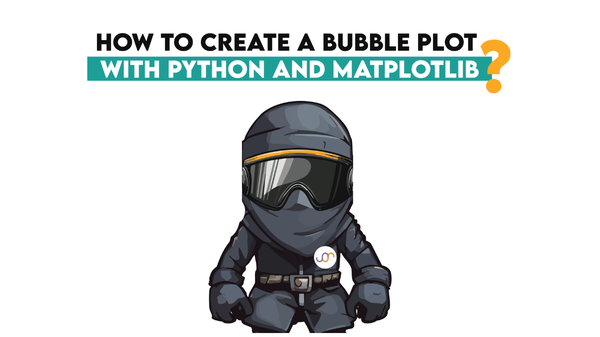The Ultimate Guide to Become a Data Scientist at Google
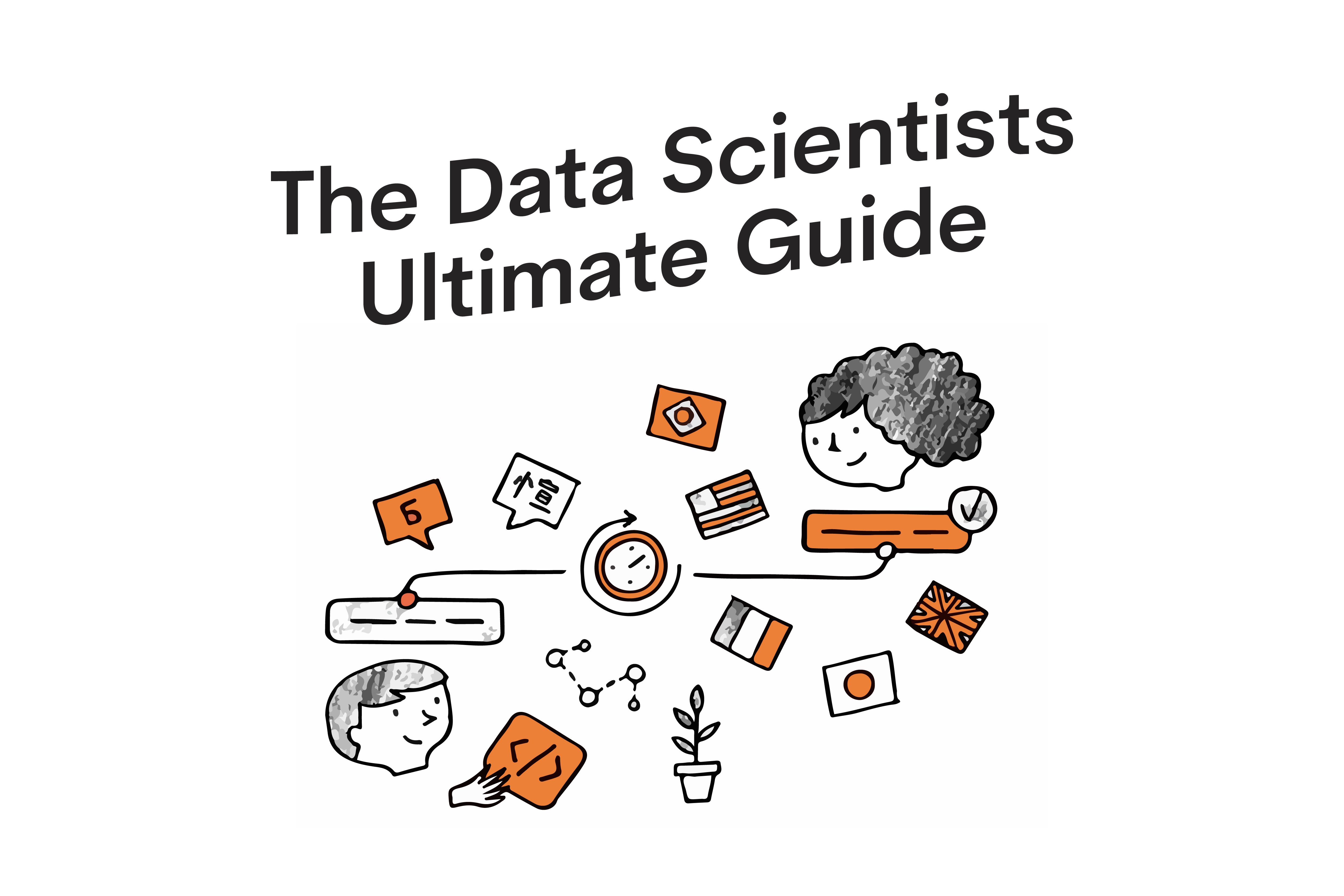
 Written by:
Written by:Zulie Rane
It’s no joke to become a data scientist at Google. Their job requirements include minimum of a masters degree, work experience, statistical & database language.
Want to land a data scientist job at Google? This guide will walk you through every step of how to become a Google data scientist.
It’s no joke to become a data scientist at Google. Checking out their job requirements for a current post includes a minimum of a Masters degree (though a PhD is preferred), experience with statistical software, and two years of work experience in a data analysis related field.
In other words, it’s not a casual whim. If you want to be a data scientist at Google, it has to be something you really, really want, not something you trip into by accident because your other gig as a cat-sitter came to an end.
This guide will walk you through every step of how to become a Google data scientist. First, I’ll cover what Google looks for in all employees, and how you can demonstrate that. Then we’ll go over what you need to be proficient in data science, and how you can gain and show those proficiencies.
Finally, I’ll end with how to nail the ideal next step - the interviews. Google has multiple steps in their application process, and too many applicants think they can show up and be done there. At the interview, you’ll need to once again demonstrate all those key competencies, both technical and personal.
Let’s get started!
1. So you want a job at Google.
Google, the G in the FAANG group of technology companies, is a very prestigious employer. Many future data scientists want to work for Google purely through brand name recognition. Others know that the cutting edge analysis there will make it a fascinating workplace.
But it’s more than just the name. Google has cultivated a reputation for an incredible workplace culture, whether you want to be a data scientist at Google or something else. Motivated, passionate, curious people are actively recruited, which means that if you’re hired, you’re surrounded by a really cool workforce. The consequence is that Glassdoor summarizes the pros by saying that it’s the people that make Google a great place to work.

But the benefits are more tangible than just culture. As a Google employee, you’d enjoy a higher-than-average salary. Payscale lists the average as $118,705 per year across all jobs, with an average Google Data Scientist salary as $133,122. There’s also an abundance of perks, like free gourmet food and snacks and bringing pets to work, according to Inc.
How Google describes their interview process
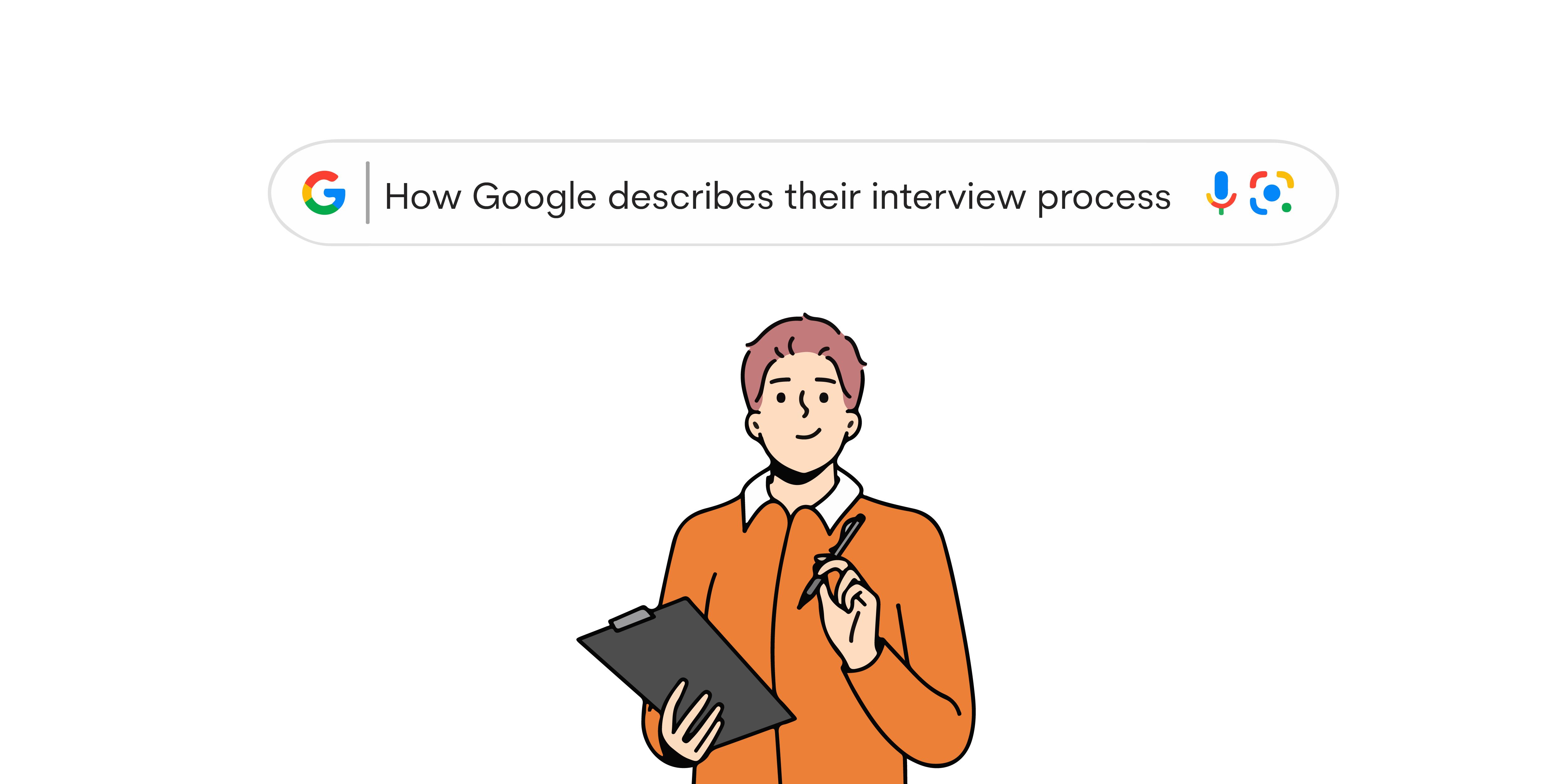
Part of what makes Google such an attractive employer is the care they take in selecting their workforce. Their online guidelines on how to be hired at any role, not just a data scientist, can be summarized like this:
- Take a beat and reflect on what you want. They’re looking for people who have a clear view on what they’re good at and what they enjoy, and want a job in the overlap of those fields.
- Review what it’s like to work at Google. They want a team that meshes well together at every level, so they ask that you do some legwork and understand what it’s like to work there, from reading their blog, their YouTube channel, their team sites, and anywhere else you can read or learn about the experience of working at Google.
- Draft a new, custom resume from scratch. It’s interesting that they recommend leaning on data, no matter what job you’re applying for. The formula they recommend is: “accomplished [X] as measured by [Y], by doing [Z].”
- Apply to multiple roles, more than once. They specifically make a point of mentioning that many Googlers who ended up in their current role applied for something else, first. “[N]ot getting a role can often be a matter of timing, rather than a reflection of your skills or qualifications,” they write.
- Complete the assessments. Like a lot of other tech employers, Google asks that you complete a battery of tests no matter what the job. They include online assessments, short phone calls, project work, and in-depth interviews in the gamut you’ll complete. It’s good to understand that they built all these tests to be a way to measure how you solve problems. They’re not trying to catch you out, but understand how you think and work.
This set of guidelines helps you understand that if you do ultimately get picked to work as a Data Scientist at Google, it’s not by accident or luck: it’s because you’re a perfect fit.
2. How to demonstrate you have the personality Google wants
If you review the guidelines above, you’ll understand that at Google, they’re looking for a highly specific set of job-dependent skills, but they’re also looking for a perfect culture fit.
This section is not about how to pretend to have those skills and talents - if you don’t have them, you won’t be a good fit - but rather about how best to show them off in the application to Google. Especially as a Data Scientist, you might be tempted to focus on your technical qualifications. Getting hired at Google is a lot more than that.
Google is actually really open about their data-driven selection process and came to two conclusions: employees need to trust one another and believe in what they’re doing. That’s what brings success to any applicant.
The four traits Google is looking for
Here’s how you can showcase the traits that will reflect your future success at Google:
- Cooperation. The old lone-star ideal of the perfect employee has been shown to be a load of garbage. No matter what your job is, but especially as a data scientist at Google, you need to showcase your cooperative skills. Can you think of an example when you worked well in a team? How did you help? What was your contribution? Equally, was there ever a bad team you were part of? What was the cause?
- Resilience. There are a lot of questions that will have hard answers, as a Data Scientist at Google or any other job. Google is not looking for people who get the answer right on the first try, because that’s not realistic. They’re looking for workers who will keep going when the going gets tough. Can you think of a time when you struggled? How did you overcome that struggle? What other areas of mental toughness can you demonstrate?
- Belief in your mission. Google is looking for employees who will believe in what they’re doing. It’s worth understanding Google’s mission, and your interest in helping them achieve that, but you should also think of previous examples where you did work for a cause you truly believed in. When you think about previous places you worked for, try to figure out the why beyond a paycheck that kept you there.
- Dependability. Google wants to build teams that can rely on each other. To make sure you show this trait, think of times that you did what you said you would on time, or took on an additional burden to help out your team. They’re not looking for hotshots, but individuals who will help a team perform better as a whole. You should think of times that your involvement helped the bigger picture, not just you as a single player.
In short, when you’re writing your resume and applying to these roles, keep those four traits firmly front of mind and you’ll be sure to align with what Google is looking for. Remember, if you can’t think of any good examples from work, take examples from school or daily life. And if you’re really struggling, then it might just be the case that you’re not a good fit.
3. What Google is looking for in a Data Scientist
So far, we’ve covered generic Google application advice. While all of what I’ve written is relevant for data scientists at Google, this next section is going to go into Data Scientist-specific detail, which is the same for many other companies that want data scientists. Google has a base set of traits they look for in all employees - and an additional set of qualifications on top of that.
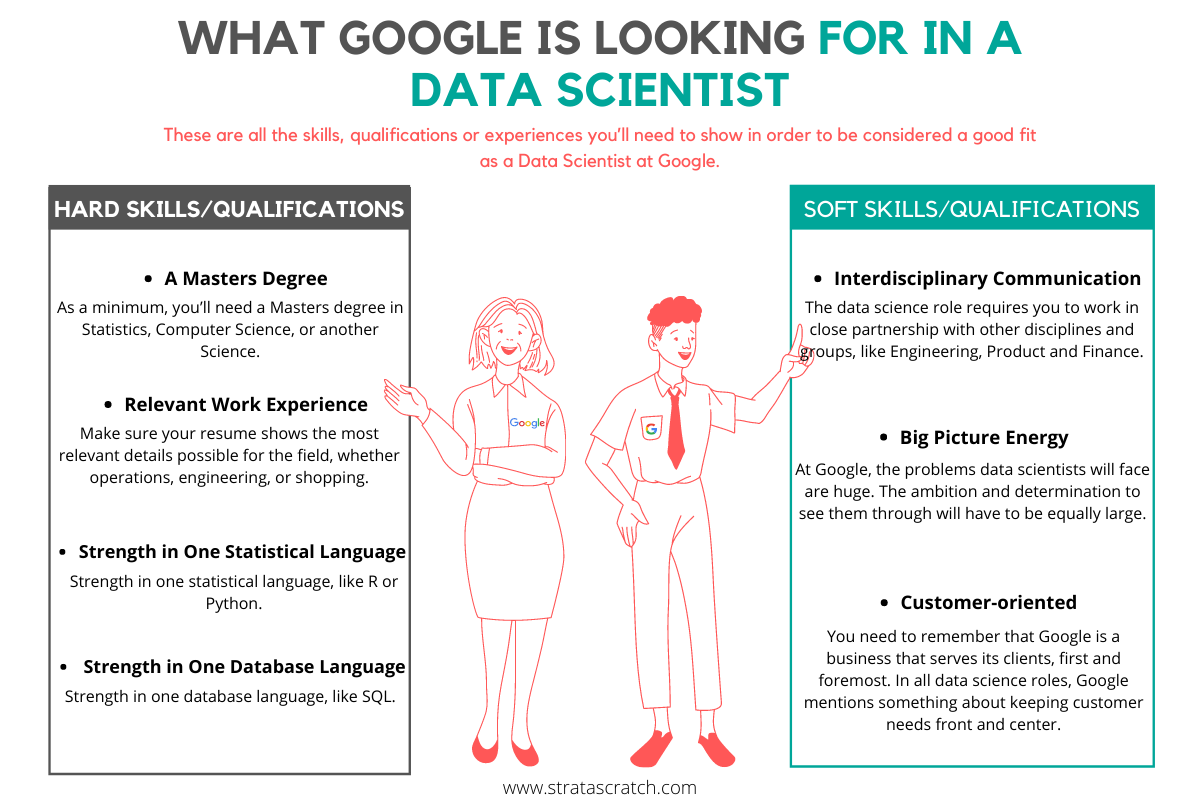
I checked out a couple of recent job listings of theirs to become a Data Scientist at Google in any field to translate what they’re looking for. Here’s the breakdown:
Hard skills/qualifications:
These are all the hard skills or experiences you’ll need to show in order to be considered a good fit as a Data Scientist at Google in any team.
- As a minimum, you’ll need a Masters degree in Statistics, Computer Science, or another Science. Some ask only for a Bachelors in a similar field, but since all these job listings say a PhD is preferred, it’s safe to assume a Masters (or extremely relevant job experience) is a must.
- You’ll also want at least some relevant work experience. They range between just saying “Experience” to asking for eight years. Due to the range, it makes sense to focus on relevance rather than years of work. Make sure your resume shows the most relevant details possible for the field, whether operations, engineering, or shopping.
- Strength in one statistical language, like R or Python. All “Data Scientist at Google” job listings ask for this.
- Strength in one database language, like SQL. All “Data Scientist at Google” job listings ask for this.
- Beyond that, there are other job-specific requirements that differ based on which data science role you’re applying to.
There’s currently an open Data Scientist, Business and Marketing job nicely demonstrating these requirements.
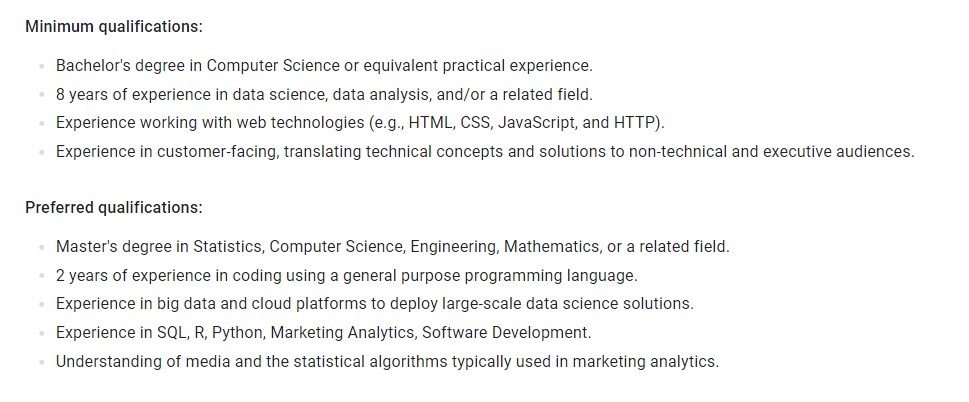
Soft skills/qualifications
These are all the softer skills or experiences you’ll need to show in order to be considered a good fit as a Data Scientist at Google. There’s a bit more creativity on offer here as to how you demonstrate them.
We’ll use the same job ad as earlier to showcase this.
- Interdisciplinary Communication: Many job listings in the Data Scientist offerings make a specific point of how the role requires you to work in close partnership with other disciplines and groups, like Engineering, Product and Finance.
- Example: “gPTO partners closely with gTech’s Support, Professional Services, Product Management, and Engineering teams to innovate and simplify our Ads products and build the productivity tools ecosystem for gTech users.”

- Big Picture Energy: At Google, the problems data scientists will face are huge. The ambition and determination to see them through will have to be equally large. Many data science job listings say something along the lines of, “You should be able to connect the dots and see the forest through the trees.”
- Example: “Leverage critical thinking and problem statement definition, decomposition, and problem solving to ensure efforts are focused on delivering impactful and actionable outcomes.”

- Customer-oriented. It’s not just enough to see the whole enterprise picture, or be able to communicate efficiently across teams. You need to remember that Google is a business that serves its clients, first and foremost. In all data science roles, Google mentions something about keeping customer needs front and center.
- Examples: “Collaborate across cross-functional stakeholder teams, managing opportunities and challenges that improve processes and help stakeholders become more data savvy.”

Additional considerations
So far, this is all freely available on the job listings. But we can also get a sneak preview at the interview questions to understand what data science traits they specifically ask for at that stage to successful applicants. This blog post discussing questions for the Data Science SQL interview looks into what Google asks at the interview stage. If Google Data Scientists are being asked this at interview, you can bet it matters at every other stage, too.
Google’s Data Scientist questions break down into six categories. The top three are: Coding, Algorithms, and Statistics. However, even though business case questions are relatively low in frequency, it’s nearly 2x the average of other tech companies. It’s a clear focus for Google.
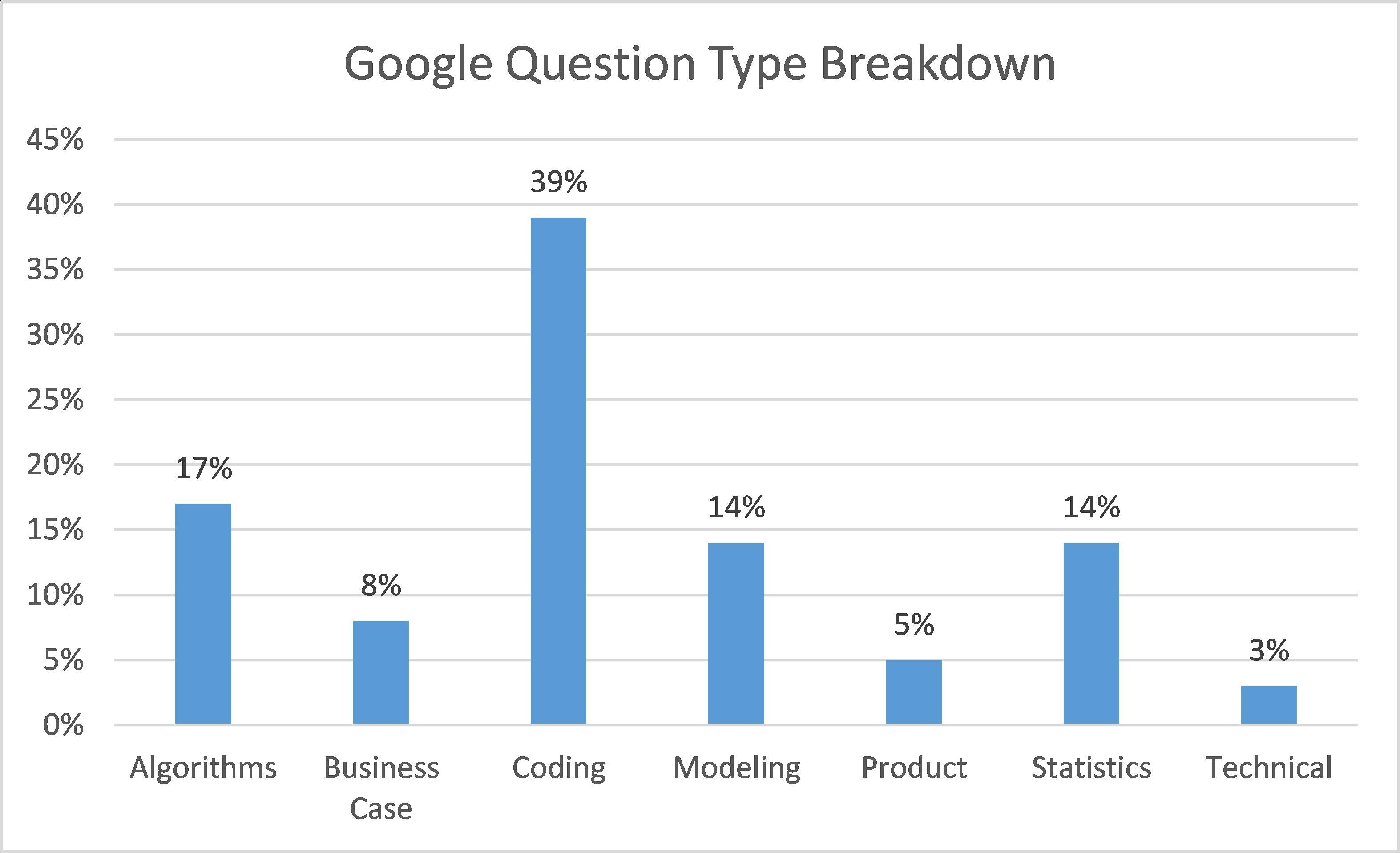
Check out our data science interview guide that includes 900+ real interview questions from 80 different companies in 2020 and 2021 - Data Science Interview Guide.
4. How to get the skills a data scientist for Google should have
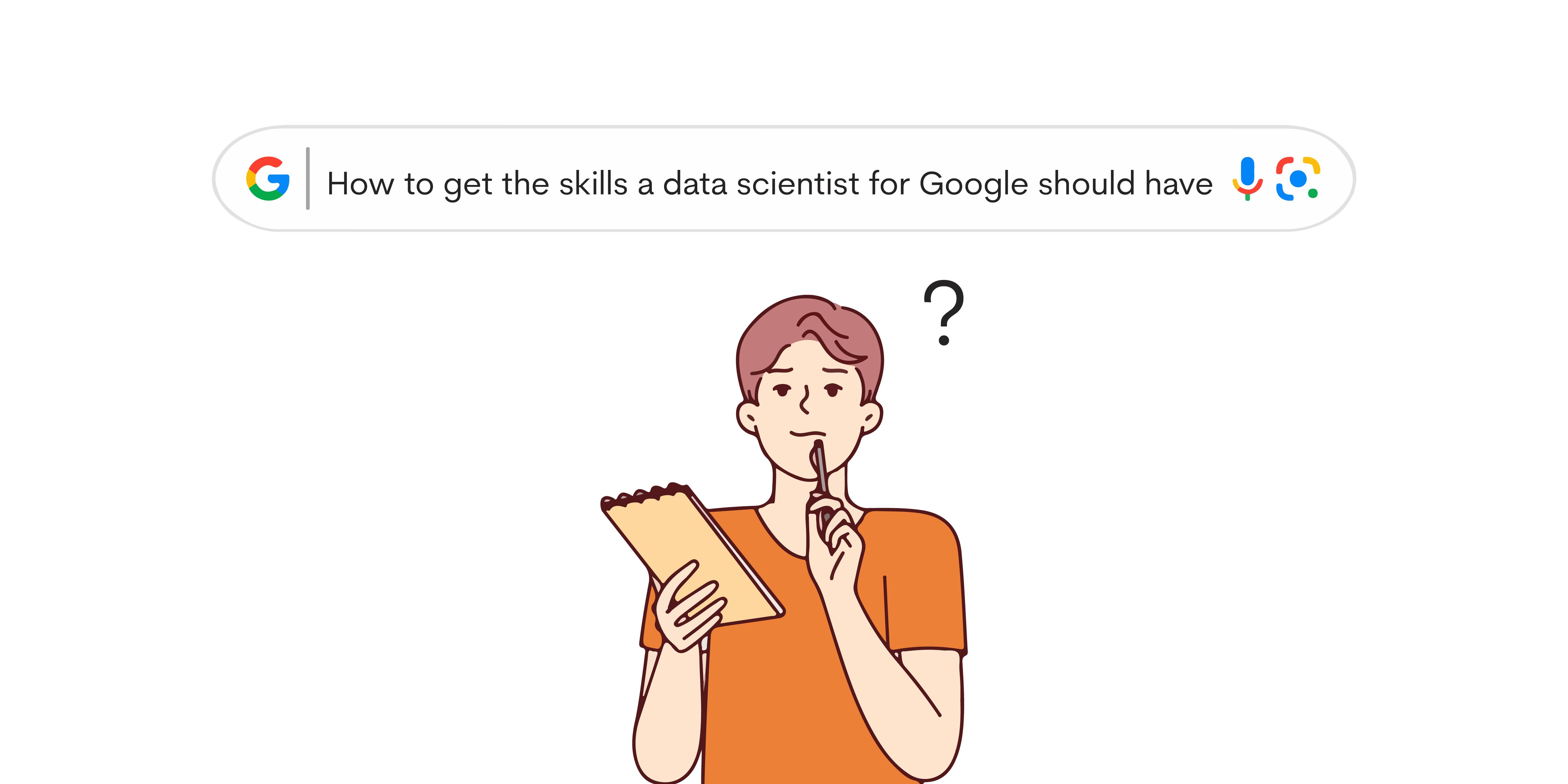
If you want a data scientist job at Google, you’ll need the education, the work experience, the coding skills, and the right personality. If you don’t have the education or work experience, it may be worth looking into alternate routes to becoming a data scientist at Google, such as these transition routes. We’ve also already covered that if you’re not the right personality type, then a job as a Google data scientist probably isn’t right.
Beyond that, there are things you can do to brush up on your hard skills. This section will focus on the best way to get the coding skills and the database proficiency that are absolute musts for data scientist jobs at Google.
Statistical language
The two most popular statistical languages, also referenced by name in Google Data Scientist job applications, are conveniently open source: R and Python. This means you don’t have to pay anything if you want to teach yourself.
I learned R partially through school, but also a large part on my own. I find it a fun language to use, and R is actively trying to get new users, so there is an absolute wealth of free and comprehensive information on how to learn R online. I’d recommend using Swirl(), which is a package in R that interactively helps you learn. I’d also suggest checking out the free textbooks such as R for Data Science. The RStudio blog is also a good place to stay up to date with new packages, datasets, and opportunities to learn. There are definitely better places to learn such skills for data science.
Python was a language I taught myself without too much difficulty. The basics are extremely easy to pick up. Like R, the creators and community of Python have a deeply vested interest in gaining more pythonistas, so there’s a huge quantity of amazing online resources to learn Python. I’d recommend beginning with the website, boot.dev.
If you are wondering how much python is required for a career in data science, check out our article on how much Python is required for data science.
There’s a lot of chatter about R versus Python. I prefer R for ease of use, but Python is great for machine learning. It depends on what you personally prefer. I recommend trying both and seeing which one is easiest and most fun for you to learn.
To truly learn a language (and to tick a box on the application) you should have a self-driven project. For example, I really started learning R when I found a set of numbers I cared about. I started learning Python when I wanted to use a bot to automate Instagram activity. Find something you care about, and learn about it with your language.
Database language
I’ll focus this section on SQL since that was the database language most often mentioned by job applications for becoming a Data Scientist at Google. Unlike R and Python, SQL is not open source, so there aren’t quite as many resources to learn it. Most tutorials are business-focused.
Because it’s such a business-focused language, I recommend you start with Google’s own resource, SQL for Data Analysis. Once you have the basics, the best way to continue is by pursuing the areas that will likely come up in the job.
Luckily for you, StrataScratch has a huge amalgamation of 500+ SQL interview questions from Google and other big tech companies. Start completing those, noting which areas are toughest for you. That will tell you where you should focus your efforts to stand out during the real interview.
5. How to show those data science skills off for Google
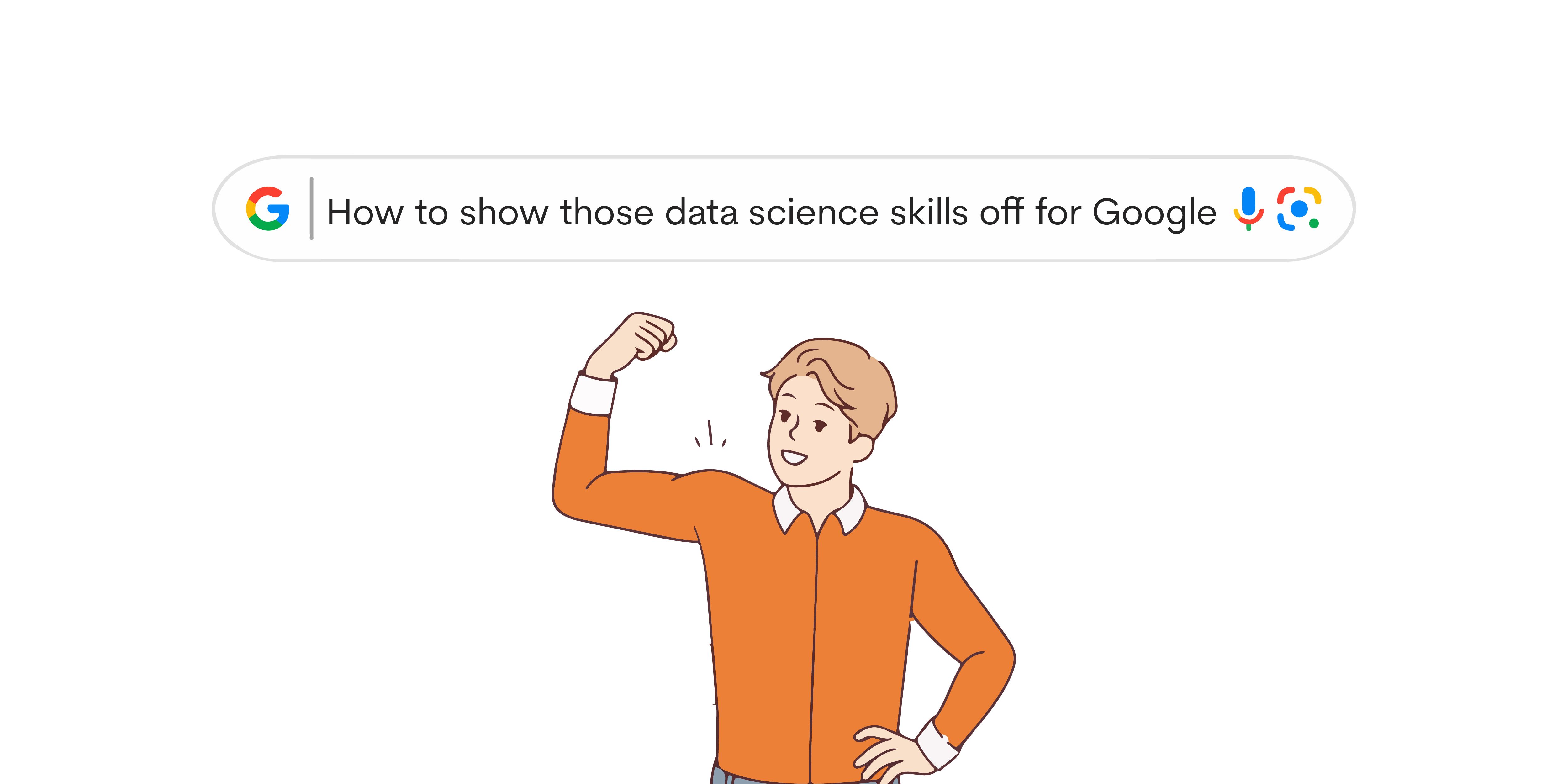
Assuming you’re a crack coder, you know everything there is to know about SQL, and you’re a shoo-in for the job, there’s still one big obstacle: presentation on your resume.
Once you get to the interview, of course, you can blow them away with your technical and analytical thinking. But before that, you need to persuade Google that you have what it takes to be a Data Scientist even from just the resume perspective.
Beyond a diploma and a few lines on your resume showing certificates, you have to showcase your technical skills. The best and most persuasive way to do so is with a portfolio. More than ever, Data Scientists are using Github as a way to give specific evidence of their coding background.
Many job listings for Google Data Scientists mention the need to demonstrate a passion and skill with analysis. Data Flair lists five potential options to use as Data Analytics projects, but be sure to use these for inspiration. To have a real chance, you should be inspired by something in your own life that you want to understand and analyze.
One possible obstacle is where to get data sources from - I recommend checking out The MockUp Blog by Tom Mock, the founder of Tidy Tuesday. It’s a great way to get familiarized with R, and to find good data sources.
Once you have thought of and hopefully done this passion project, think back to the original section where Google makes it clear the traits they value. How can you demonstrate your passion project fulfils those technical and personality characteristics that they’re looking for? Keep those traits front of mind as you describe the project, your motivations for doing it, and the outcomes.
6. Nail your data science interview at Google
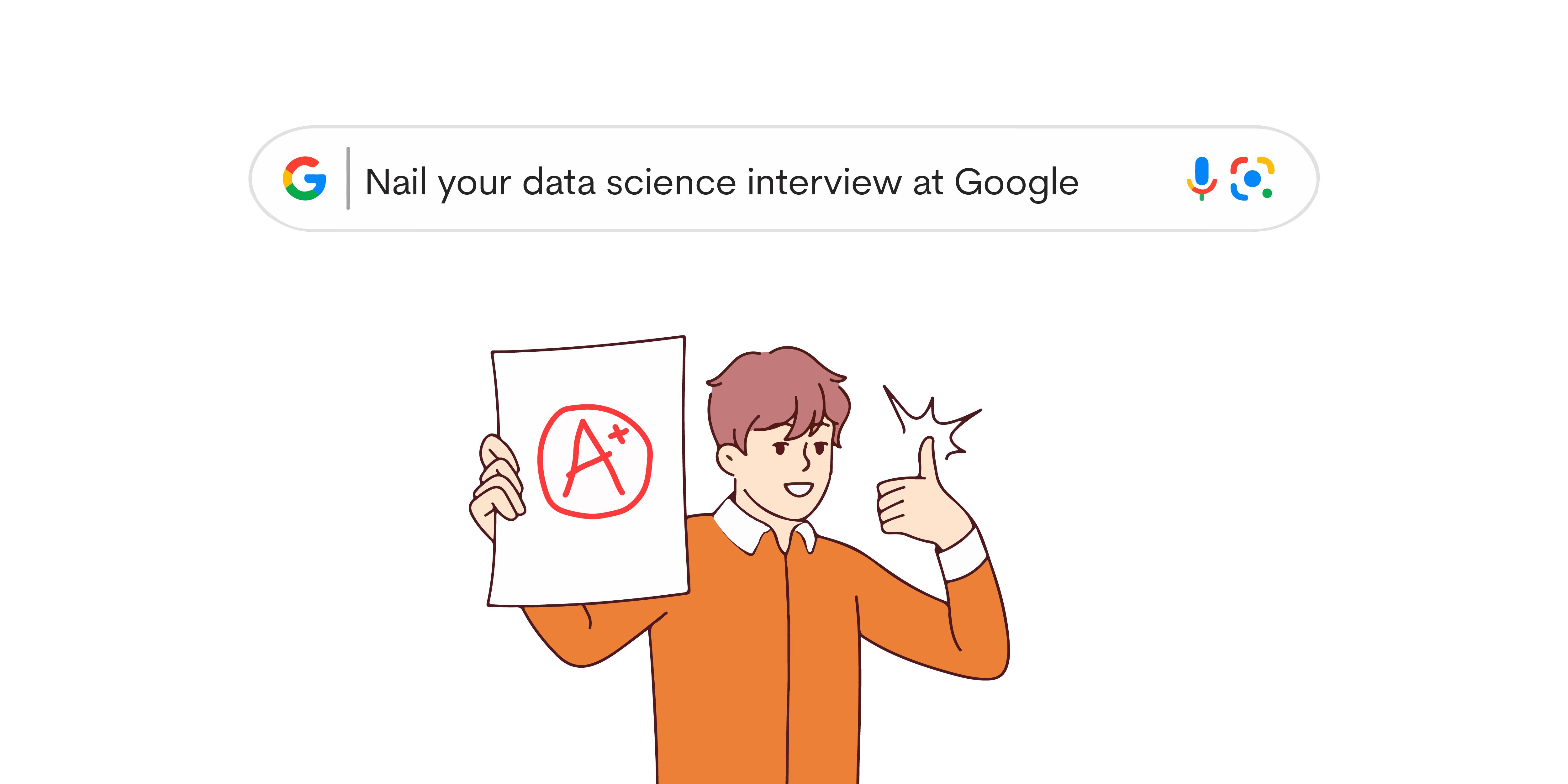
If you’ve followed this guide so far, you hopefully have applied and received an interview invitation. That’s great - but it’s not the end goal. At the Google Data Scientist interview, your interviewers will be looking for different things: your personal attributes, your practical skills, and general interview etiquette. Let’s break it down.
Practical skills and example questions
You can practice the technical skills with any of the resources - there are plenty of places to look for the technical data science questions you’ll be asked. Even though you may feel confident, make sure you’ve brushed up on as many specific examples as you can find, so questions won’t catch you off guard. Even if you do perfectly well in the technical arena, Google is also looking for how well you think under pressure. The more practice you get, the smoother you’ll be.
Here’s a description and an example of each type of question asked at data science interviews. Where possible, I’ll include an actual example from Google, but since many of the questions at the FAANG group of companies are similar, I can replace with another company’s similar question if there isn’t one currently available for Google.
1. Coding:
a) Definition: These are questions that require some sort of data manipulation (through code) to identify insights.
b) Example from Google: Find the number of times the words 'bull' and 'bear' occur in the contents. We're counting the number of times the words occur so words like 'bullish' should not be included in our count. Output the word 'bull' and 'bear' along with the corresponding number of occurrences.
2. Algorithms:
a) Definition: These need you to solve a mathematical problem using one of the programming languages. These questions involve a step-by-step process usually requiring adjustment or computation to produce an answer.
b) Example: How would you count the number of occurrences of a letter in a word using Python? (Generic algorithm question)
3. Statistics:
a) Definition: These need you to bone up on knowledge of statistical theory and associated principles. Google is testing you on founding theoretical principles which are used in data science processes.
b) Example: What is the expectation of variance? (Facebook)
4. Modeling:
a) Definition: Questions related to machine learning and statistical modelling (regressions). They require the knowledge on how to use mathematical models and statistical assumptions to generate sample data and make predictions about real-world events.
b) Example from Google: Why use feature selection? If two predictors are highly correlated, what is the effect on the coefficients in the logistic regression? What are the confidence intervals of the coefficients?
5. Business Case:
a) Definition: Questions involving case studies as well as generic questions related to the business that would test a data science skill.
b) Example from Google: How many cans of blue paint were sold in the United States last year?
6. Product:
a) Definition: Questions related to evaluating the performance of a product/service through data.
b) Example: If 70% of Facebook users on iOS use Instagram, but only 35% of Facebook users on Android use Instagram, how would you investigate the discrepancy? (Facebook)
7. Technical:
a) Definition: These questions ask about the explanation on various data science technical concepts. They’re similar to the coding ones, but require you to have more knowledge on the technology you’d be using at Google as a Data Scientist.
b) Example: What is the difference between a linked list and an array? (Amazon)
The main piece of feedback offered by Glassdoor’s info on Google’s Data Scientist interview is to understand the basics. Many candidates overthink, or panic into nervousness when they can’t immediately come up with an answer. The fundamentals are going to underpin every question you get.
Personal skills
Remember, Google wants passionate, collaborative, creative, driven people as their Data Scientists. Let that drive your answers. Even if it’s a technical question, try to demonstrate how you’d solve the problem while showcasing your collaboration skills, or explaining why you’d be driven to answer it in that way.
Basic interview skills
Definitely don’t forget the handshake, the follow-up, the eye contact and the confidence. But basic interview questions also includes items like:
- Pacing. As a Google Data Scientist interview, you’re going to have rounds and rounds of interviews - five in total, with just a lunch break between them. Speak slowly, drink water when you need to, and keep in mind it’s going to be a long day.
- Friendliness. You’re being tested on how well you fit into the team, as much as whether you have the right skills for the job. Google is looking for people who enjoy working with each other. Try to get into the mindset of enjoying the interviews and having fun with your interviewers.
- Good listening. It’s a fact that when people get nervous, they listen less well. Practice good active listening skills with your interviewers. This will help you better understand what you’re being asked, cut down on miscommunications, and build rapport with your interviewers. Good listening is a rare skill.
Conclusion
Many people dream of getting a data scientist job at Google - it’s an incredible opportunity to have a real impact on hundreds of millions of people in real life, work with an amazing company, and get incredible benefits like a hefty paycheck.
The main thing Google is looking for in its Data Scientists is that they’ll be a good fit for the job. Why do you want to do Data Science at Google? If it’s just for the brand name, or because you don’t know what else to do, it’s not enough. If you have to lie or exaggerate, you’re not a good fit. If you don’t get the job, it’s probably for the best, or not yet your time.
But you can be confident: If you have the skills, the prep, and the passion, you’ll be a shoo-in. As long as you nail the fundamentals, present your skills appropriately through the resume and interview process, and demonstrate how good a culture fit you are, you’ve got a one-way ticket for one of the best jobs in the world.
Also, check out our comprehensive guide "How to Become a Data Scientist from Scratch" which will take you through every necessary step to become a successful data scientist.
Share
